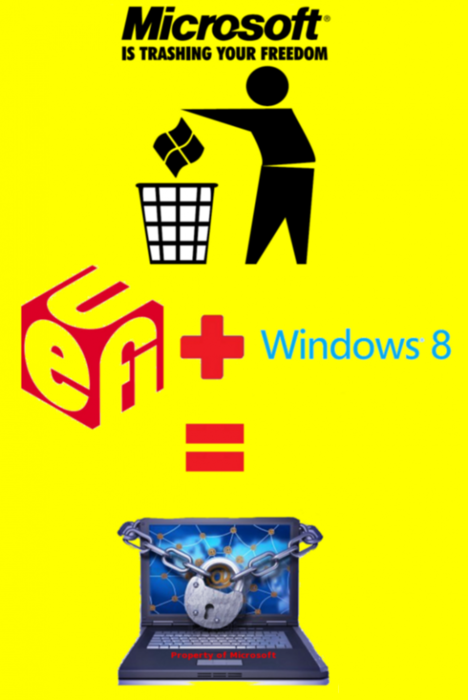10.14.12
Posted in BSD, GNU/Linux, Kernel, Microsoft at 11:26 am by Dr. Roy Schestowitz

Summary: Microsoft responds to defeat by playing dirty, but many people speak out against this
STEVE Ballmer says that Microsoft Is a “Devices and Services Company”, notes Tracy. “Anyone else happy to see that? They don’t claim to be an OS company anymore” he says. “They are losing their grip on the market via the OS and the Windows mobile OS barely has any market share.”
Here is one such article which speaks of Ballmer’s revealing words. Some of the weakest points are being pushed forth as strengths.
Vista 8 has been slammed by several hardware companies, so what devices was Ballmer talking about? Microsoft needs a lot of brainwash to save the monopoly, so it throws billions into public relations with a dedicated shill who was appointed internally: “Guggenheimer had served as corporate vice president of Microsoft’s OEM division, and in his new role Guggenheimer replaces Walid Abu-Hadba.”
We wrote about Guggenheimer before [1, 2] due to ugly things which were done. It was about anti-competitive behaviour.
“As a side note, OpenBSD and the FSF should be praised whereas Linux Foundation denounced for playing along with this, even if passively.”Additionally, Microsoft makes Linux booting harder on hardware using UEFI requirements that writers complain about. As one put it: “EFI, and the later UEFI specification, is not the problem for Linux. The problem is Microsoft’s other requirement for any Windows 8-certified client: the system must support secure booting. This hardened boot means that all firmware and software in the boot process must be signed by a trusted Certificate Authority (CA).”
The Microsoft boosters hide the problem with UEFI, but notable figures speak out loudly: “The un-unified efforts by these distributions did not go very well with the entire open source community. OpenBSD founder Theo de Raadt criticized both Canonical and Red Hat. “I fully understand that Red Hat and Canonical won’t be doing the right thing, they are traitors to the cause, mostly in it for the money and power. They want to be the new Microsoft.””
Theo de Raadt is right on this one.
Microsoft is losing the OS war because of devices. Linux and Android reign there. So Microsoft is resorting to dirty demands from device makers.
As a side note, OpenBSD and the FSF should be praised whereas Linux Foundation denounced for playing along with this, even if passively. █
Permalink
 Send this to a friend
Send this to a friend
Posted in Patents at 11:13 am by Dr. Roy Schestowitz
Summary: A roundup of news about software patents and the increased levels of attention this topic has been receiving
Now that large companies like Samsung, LinkedIn, and Facebook get sued for alleged software patent violations [1, 2] we are hearing more and more from the press about the problem. Many Facebook users and Android/Galaxy users are royally pissed off. Even the world’s biggest patent troll is being denounced openly by the British press, which states: “A division of Intellectual Ventures, the IP-holding company founded by Nathan Myhrvold, Microsoft’s former CTO, has been granted a patent on a system for introducing digital rights management (DRM) controls to 3D printing.
“Under the system described in the patent, files containing plans for printed objects would be encased in a digital envelope that would check if the original designer had either given permission for the plans to be used or been paid for their product. Software to handle this would be embedded in 3D printers to make sure they couldn’t produce unauthorized copies.”
DRM and patents — two evils for the price of one. So, who can still oppose a reform? Days ago we found an apologist who says that software patents opposition has merit but may be required for startups. We do, however, agree on the subject of trolls: “This is bad enough for a large corporation, but for a small startup, the cost of fending off trolls can be fatal. Trolls don’t play fair, and their weasely behavior hurts not only those they attack directly, but the entire system. I don’t doubt for a second that the patent system should be reformed. When an empty company’s raison d’etre is the procurement and enforcement of patents, purely as a revenue resource, with absolutely no intention of practicing those patents, than that company is behaving unethically, immorally, and the law should absolutely reflect that.”
Needless to add, patent lawyers continue promoting software patents, but they are outnumbered by far. Dissent against them in the press has gone very mainstream [1, 2, 3] all across the world, with Apple's abuse paving the way. It helped sway public opinion or stress the importance of the topic.
Joe Mullin went to Texas to cover the patent trolls epidemic and he says that “[a] long-dead dot-com business, revived as a patent-holding company called DDR Holdings, today has new life with a Texas patent victory. Two patents owned by the company, both of which cover a way of creating an online store that it says is widely used in e-commerce, were found valid and infringed.
“The victory wasn’t clear-cut though. The two defendant companies, Digital River and World Travel Holdings, were ordered by the jury to pay $750,000 each, for a total of $1.5 million. That’s a lot of money, but it’s less than 10 percent of the $16.2 million that DDR asked for. Putting on a patent trial can cost as much as $1 million, so DDR may not make much from this case.”
Mullin explains that designs can be patented if you add “over the Internet” or something along these lines, e.g. slide to unlock. Mullin notes all this in a separate article where he writes: “The slide that defense lawyers showed to the jury read: “This isn’t new.” In a patent case, it could have been a smoking gun—after all, it was written by the inventors themselves. They were describing their business, Nexchange, to a San Francisco conference back in 2000; it was three years before they received their first patent and turned their focus to litigation.
“But hours later, inventor Daniel “Del” Ross Jr. was on the stand, and he seemed none too concerned that the crux of his idea was old—if not ancient. He had a patent, twice reviewed by the US Patent Office, and a simple story to tell: “The big difference is, we invented this for the Internet,” he told the jury.”
This helps show how unhinged from reality this whole system became. “It’s a bit ironic that people think that for pharmaceuticals patents are the only answer,” writes David K. Levine. This is another family of very controversial patents.
Over at Groklaw, another article opposing software patent has just been published. PolR writes: “You probably have heard computer professionals say that software is mathematics. You’ve certainly read it on Groklaw more than once. But is it true? What does that statement mean? I want to show you, first, why it’s true, and I will also answer some typical criticisms. My purpose, however, is to suggest a way to develop a test for when a patent involving software is or is not patent-eligible, now that the Federal Circuit has granted an en banc review of CLS Bank International v. Alice Corporation.”
Let us hope that many such articles will continue to be published. It’s no longer a niche; likewise, Linux advocacy becomes somewhat obsolete now that Android promotion is everywhere — from the press to billboards, from word of mouth to shops. █
Permalink
 Send this to a friend
Send this to a friend
Posted in Apple, GNU/Linux, Google, Microsoft, Patents at 11:00 am by Dr. Roy Schestowitz
Technological vultures

Summary: Microsoft files another patent lawsuit against Google as Apple and Microsoft calls for Android ban are finding deaf ears in the courts
Microsoft files another patent lawsuit against Google as Apple and Microsoft calls for Android ban are finding deaf ears in the courts.
The ban on some Android devices was recently lifted as “Apple has lost another major battle to Samsung as the US appeals court overturns the ban on Galaxy Nexus device. Only ten days ago Judge Koh lifted the ban from Galaxy Tab 10.1 as the misguided jury did not find the tablet to be infringing upon Apple’s patents. The basis of this ban was ‘unified’ search which allowed users to search apps, files and the Internet from one box.
“The Appeals court said in its order that “We hold that the district court abused its discretion in enjoining the sales of the Galaxy Nexus.”
“Remember that this time Microsoft hits with another set of software patents, reminding us of TomTom.”Apple and Microsoft have been lobbying hard to ban or tax Android. “The Federal Trade Commission is investigating Google’s policies around licensing certain patents and suing other companies that it claims infringe on them,” says the New York Times and this comes after lobbying from Microsoft and Apple. What’s more, after Motorola liberated itself from Microsoft lawsuits [1, 2, 3, 4, 5, 6]] (Microsoft had started it) quickly enough we learned about Micosoft’s reaction. The monopolist lost one case, so then it tries to use sanction for more blackmail against Motorola. Microsoft is reduced to just using patents against Linux (through Android), in a battle to ban and/or tax the competition. It going after Google again (in Motorola clothing). See :”Microsoft sues Motorola Mobility over mapping patent” and more in [1, 2]. Remember that this time Microsoft hits with another set of software patents, reminding us of TomTom. █
Permalink
 Send this to a friend
Send this to a friend
Posted in Microsoft at 10:43 am by Dr. Roy Schestowitz

Summary: Readers report a surge in the number of whitewash placements or articles
wHEN YAHOO! got abducted and destroyed by Microsoft we wrote all about it. Later on there was a disgusting wave of whitewash and revisionism, saying that Yahoo! would have basically ended up the same way if Microsoft hadn’t gotten involved.
“It is bad enough that Microsoft destroyed Nokia, MeeGo, and even hurt Qt/KDE; it’s another thing for all of this history to be erased.”Right now we find a similar wave of whitewash and propaganda. Andrew Orlowski, the longtime FOSS basher, writes about Nokia at a time when Elop et al. try to rewrite history and pretend that MeeGo would not have worked. Ask Samsung or Jolla if that makes any sense. As one writer put it: “Nokia Brings a Very Dull Knife To the Smartphone Fight Nokia has managed to sidestep ruin with its Lumia smartphones that are doing surprisingly well in a market that’s already saturated with iPhones, Android handsets, and Blackberries. They’ve successfully carved out a small niche with devices that genuinely have something new to offer in terms of UI and capabilities. So why has it pegged its new Apple attack ad on on something as mundane as color?”
Please report to us articles that blame anything but Microsoft for Nokia’s rapid collapse. These needs to be corrected because they are spread after the liars seed the revisionism. It is bad enough that Microsoft destroyed Nokia, MeeGo, and even hurt Qt/KDE; it’s another thing for all of this history to be erased. █
Permalink
 Send this to a friend
Send this to a friend




















 Content is available under CC-BY-SA
Content is available under CC-BY-SA